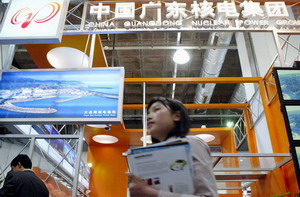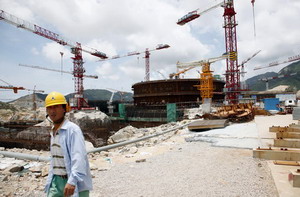China's property developers under pressure
Updated: 2011-08-12 08:50
(Xinhua)
|
|||||||||||
BEIJING -- China's property developers saw their inventories surge in the first half of this year as government measures to cool the market have started to bite, latest statistics show.
Total inventories of 20 listed real estate developers that had released their semi-annual reports as of Wednesday soared 46.3 percent year-on-year to 317.76 billion yuan (about $49.65 billion) in the first half of 2011, according to Wind Information, a Shanghai-based financial data provider.
China Vanke Co, the country's largest property developer by market value, had 171.37 billion yuan of unsold houses as of June 30, up 28.5 percent from three months earlier, the company's semi-annual report showed.
In the same period, another major developer China Merchants Property Development saw its inventory rise 15 percent to 44.47 billion yuan.
Pressure weighed more heavily on the other 18 smaller developers, whose inventories totaled 101.93 billion yuan at the end of June, up 42 percent year-on-year.
Growing inventories and tightening bank lending may press developers, especially small ones, to cut prices substantially in the second half of this year to stimulate sales, analysts said.
Zhang Yue, chief analyst with Homelink, said sales and capital conditions of real estate developers will worsen if China continues to tighten credit and restrict home purchases.
"Small- and medium-sized developers are less competitive and will be hit by the first shock wave," said Zhang.
Market shrinkage has prompted more mergers and acquisitions in the property sector, with 62 equity merger cases worth 17.54 billion yuan occurring in the Jan.-July period, up 72.2 percent and 101.9 percent year-on-year respectively, according to the Beijing-based real estate agency Centaline Property.
Rocketing property prices have been a major government and customer concern in China as many ordinary citizens can't afford an apartment.
The Chinese government has restricted residents in major cities from buying second or third homes, required higher down payments for mortgages and instituted new property taxes in the cities of Chongqing and Shanghai to rein in the runaway prices.
In June, 26 cities out of a statistical pool of 70 major cities saw new home prices decline or remain unchanged from a month earlier, official data shows. Only 20 cities saw lower or unchanged prices in May.
Government measures to curb credit may speed up the decline of housing prices in the second half of the year, said Guo Yi, marketing director of Beijing-based Yahao Real Estate Selling and Consulting Solution Agency.
China's inflation rate accelerated to a 37-month high of 6.5 percent in July. The central bank has raised benchmark interest rates three times and banks' reserve requirement ratio six times this year in an attempt to halt price rises.
Fearing a downturn, institutional investors had reduced their holding of real estate shares to 82.98 billion yuan by the end of June, a near 80 percent drop from three months earlier, according to Wind Information.
Related Stories
Chinese property firms getting squeezed 2011-08-10 15:04
China's property market attracts global giant 2011-08-09 17:24
Vanke July property sales slightly up 2011-08-05 09:25
Crossroads for property prices 2011-08-04 16:13
- New cable network set to launch in September
- China's exports feel the hard pinch
- China Railway cancels $976m private placement
- Crash probe blames faulty design
- Apology urged for oil leak
- Chinese train maker recalls 54 high-speed trains
- Vehicle parts firms on acquisition road
- Alibaba.com sees profits rise













